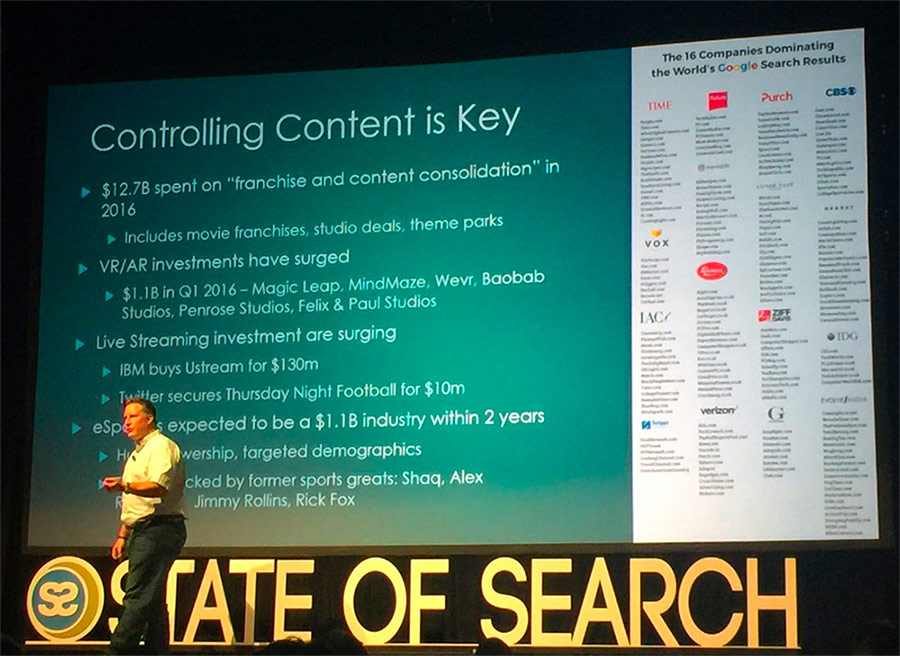With the growing presence of AI in search results and legitimate pressure on Google’s dominance in the space, the SEO industry is seeing some huge changes.
As someone who has been focused on SEO for more than half of my life, I decided it’s time to keep a log of what exactly is happening.
In this report I’m sharing 34 insights on what I’m seeing, and whether SEO is still a channel people should be focusing on.
Each point has a rating about how I feel it impacts our industry. Here are the current scores:
If you have any suggestions or feedback, I would love your thoughts on LinkedIn, X and Facebook. Until then, let’s dive in…
Across 490 sites owned by Digital Goliaths, just 18% show search traffic increases year over year
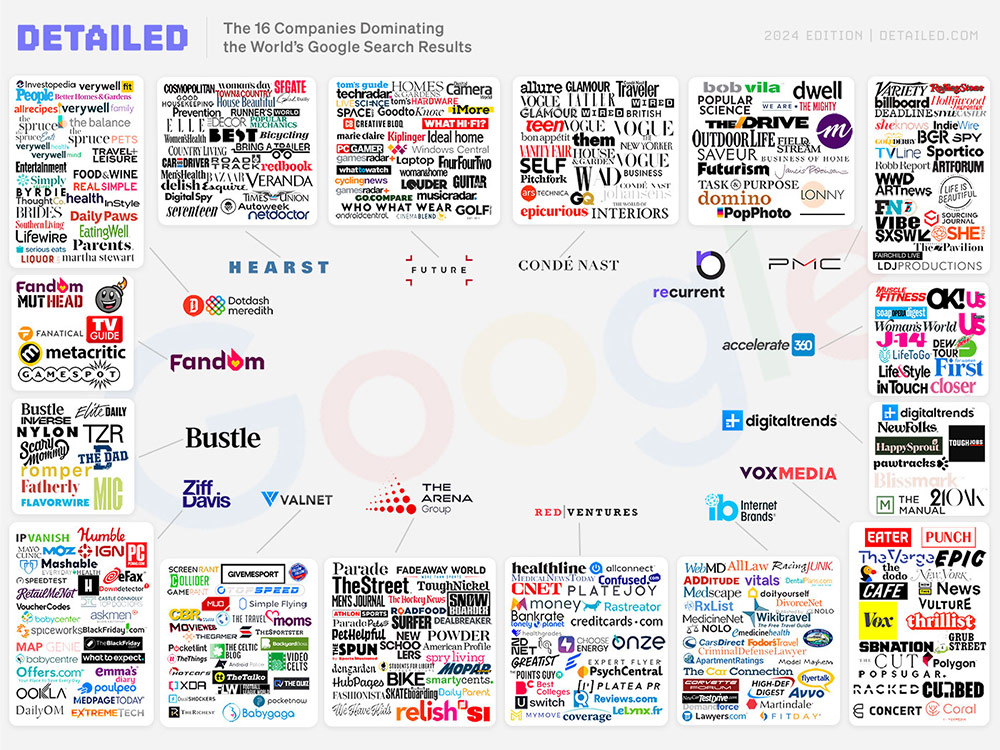
I checked the numbers for most of these sites again comparing April 2025 vs April 2024.
I recently analysed the search traffic to hundreds of sites owned by Digital Goliaths such as Hearst, Vox Media, Condé Nast, Future, The Arena Group, Ziff Davis, Dotdash Meredith and Internet Brands.
Specific websites of theirs you're likely familiar with include Cosmopolitan, GQ, Elle, Esquire, Wired, The Verge, Tech Radar and countless more.
While I generally think covering Digital Goliaths is fair, I'm not going to give details on every site we looked at (if you like, many more are covered in this report).
Sites we saw increases for include Simply Recipes, SeriousEats and Bicycling.com.
Sites we saw decreases for include WebMD, Eater, Country Living and Avvo.com.
As many are public companies, I must stress that search is not their only traffic source, and third-party data will never be perfect. SEO tools don't pick up traffic from Google Discover, for example, which many of these companies benefit from.
Still, the number of sites seeing decreases is higher than expected, pointing to concerns about the future of content sites in search results.
People are still public about the success they're having with SEO in 2025
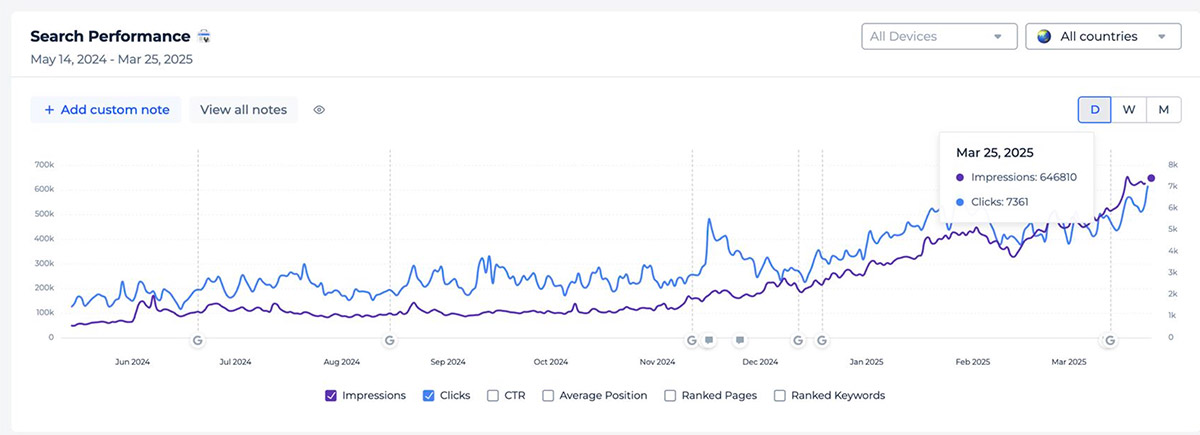
Search traffic to influencer marketing platform, Favikon.com, which had a record day on March 25th with 7,000+ clicks
Chatbase.co grew organic search traffic 68% in the past 5 months, generating 68,000 clicks from 7.5 million impressions. It played a part in helping them increase monthly recurring revenue by $103,000.[1]
In March 2025, Playbooks.com pulled in 4,900 visitors from search in "just over a week since launch".[2]
On March 25th 2025, Favikon.com hit a new search traffic record, with 7,361 clicks sent from Google.[3]
Edward White, head of growth at email marketing platform Beehiiv, said "our organic performance at an all-time high" after doubling down on content creation.[4]
Pieter "Levels", behind sites like Nomads.com and PhotoAI, says "most of my traffic comes from SEO"[5]. From some of his comments, I understand he's seen a dip here, but it's still his top traffic source.
Philip Baretto credits SEO with helping him build a SaaS business generating $400,000 in annual revenue.[6]
In May 2025, Daniel Pati said "after nearly three years of working at Maersk, the tech SEO is the best we can make it, and we’re getting the results to validate that."[7]
Granted, Maersk is a huge brand, but it's yet another example of a site seeing growth.
There's a big internet out there so someone will always be doing well with a traffic source that others aren't. Still, some people act like Google doesn't send traffic anymore, so it's nice to share some examples (of which I have many more).
- Chatbase.co's Sandra Djajic Tweet
- Ian Nuttall Shares Playbooks.com search traffic update
- Ivan Palii shared Favikon.com stats on LinkedIn
- LinkedIn post about Beehiiv's organic traffic growth
- Pieter Levels tweet about how valuable SEO is
- Philip Baretto tweet on SEO success for his SaaS
- Daniel Pati Linkedin post on Maersk's success
Analysing terms with a combined 100M+ monthly searches, Goliath brands dominate most industries and site types
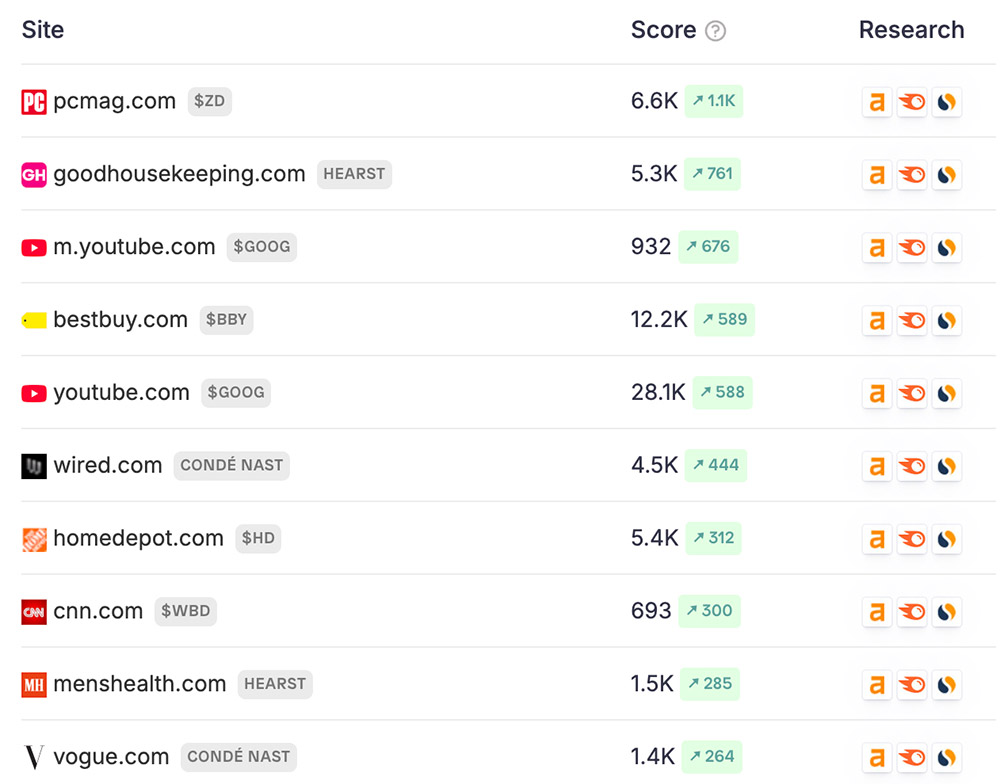
As of May 2025, the top 10 trending sites we see across the web are owned by public companies or Goliath brands
Goliath brands dominating search results is something I've been publicly writing about since 2017, when I first released my guide to the '16 Companies Dominating Google'. It has been updated as recently as 2024, with the 2025 version in progress.
Now in 2025 I'm checking most search results weekly, and on our sister site Gaps.com we have a page which tracks the top ranking sites across lots of different industries.
One additional 'feature' on that page is that you can see the ownership behind many of the top websites.
As I write this in May 2025, 80% of the top results are from sites owned by Digital Goliaths and / or public companies.
Technically that number is conservative, as there may be some ownership scenarios I've missed.
There is some logic to this, whereby it's "safer" for search engines to promote the content of these companies, knowing there's less chance they're going to recommend dangerous and harmful things Google does not want to be seen to be promoting.
Of course, this favoritism has also been abused to the point where big brands happily cover topics they don't have expertise in, knowing they'll still likely rank.
Wikipedia, estimated to be highly reliant on SEO, has seen fairly stable traffic over the past ten years
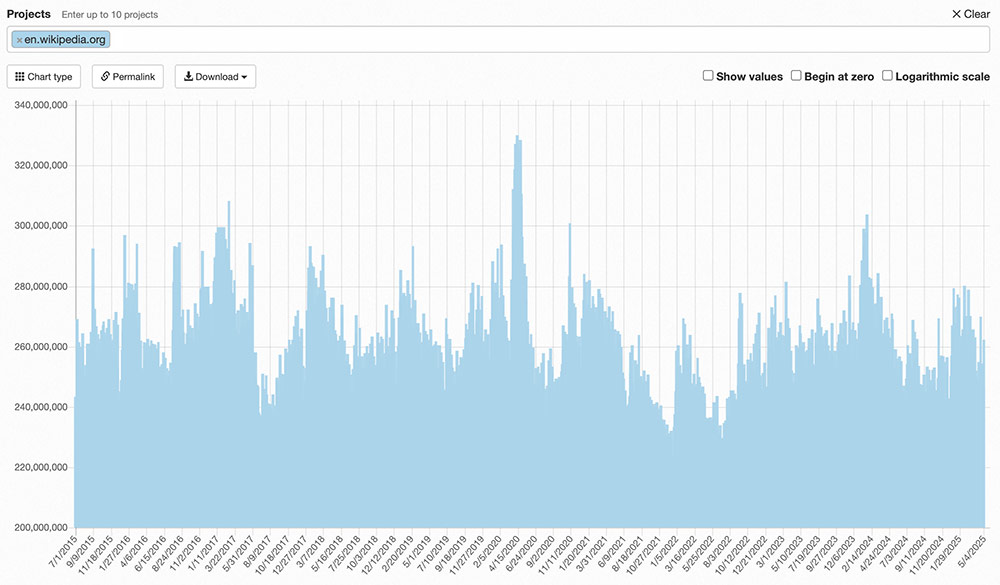
A 10-year traffic chart for the English language version of Wikipedia
Many people don't realise that Wikipedia analytics are fully open and public.
While we can't see their top traffic sources from their first-party data, tools like Similarweb estimate 85% of traffic to the site comes via organic search.
Similarly, Semrush estimates around 2.3 billion clicks from Google are sent Wikipedia's way each month. A number that has generally trended up over the past decade.
We can see from Wikipedia analytics that overall traffic to the site has remained relatively stable despite what is happening in the world of search.
Since they don't solely get traffic from search it might look like I'm stretching for positive news to share. Perhaps I am here, but I still would have expected a more prominent decline.
P.S. You may not know this but a few months ago I created a free keyword research tool using the Wikipedia API which you can find here.
While SEO opportunities are posted daily on great sites like SEOJobs.com, the number of listings elsewhere is down
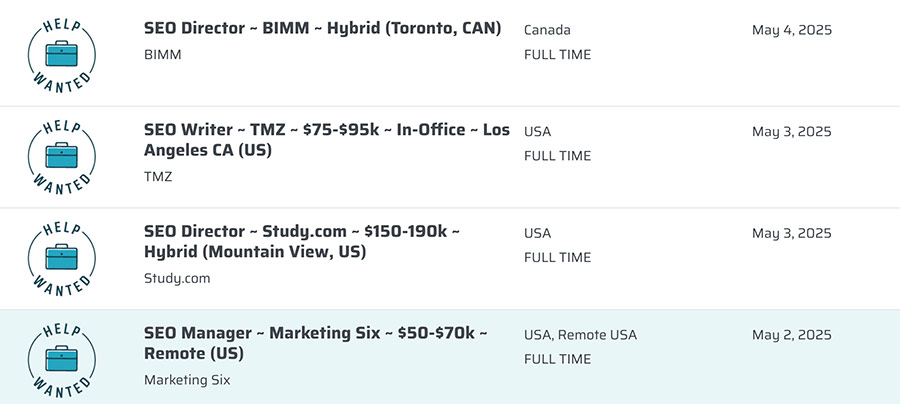
May 2025 SEO job opportunities being posted on SEOJobs.com
Across the web, successful brands behind all types of websites are actively seeking people to help them get more traffic from search engines.
Daily postings on Nick Leroy's SEOJobs.com is a good example of this.
That said, in his report on the 'State of the SEO Job Market' Nick revealed that when analysing over 80,000 job listings with the team at SourceStack, they were down 37% year over year.
The data is slightly older than what I would like to share here (it's from Q1 of 2024) but it's some of the best we have in the space.
It's hard to imagine based on what's happening that we'll see a huge swing in the other direction going forward.
A March 2025 study of 35,000 websites found search drives 43.8% of their traffic, vs 0.1% for LLMs
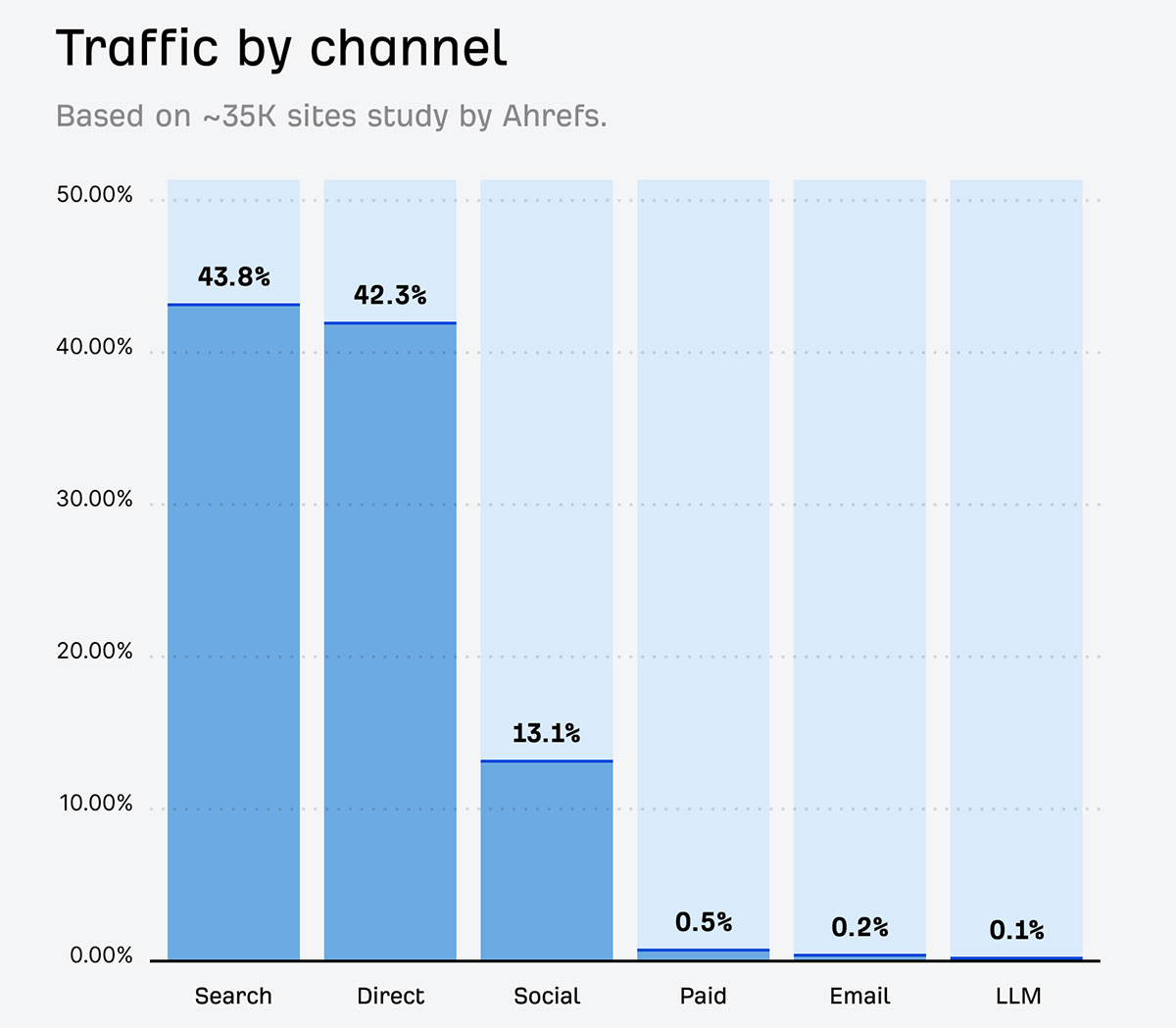
Data from a March 2025 study by Ahrefs looking at 35,000 websites.
In March, Ahrefs' Louise Linehan shared a study looking at traffic to 35,000 websites.
Their data showed that search drove more traffic to websites than any other source, accounting for 43.8% of visitors.
Of that, Google made up almost all of it.
There is likely some bias here since people familiar with Ahrefs and their analytics are likely people who have been focused on growing search traffic for a while. I say this as I think the data is from their own analytics offering, but I did not see that mentioned.
As Louise mentioned, traffic from AI channels likely isn't being fully attributed, but isn't likely to be a much larger number.
Thirty-five thousand websites is a lot, but it's also small on the scale of the web, so Ahrefs' numbers will likely get more valuable and accurate over time. I'll make an update here if they share similar insights going forward.
Every industry is being impacted by AI (and some much more than search)

Sadly, people are losing their jobs in countless fields
It's easy to get caught up in the social media bubble about the demise of SEO and perhaps just as easy to forget how AI is impacting far more than just our industry.
Consider the upheaval that AI has caused in industries like design, copywriting, cybersecurity, programming, interior decorating, music creation, voiceover acting, book publishing and more.
The only constant is change, and while it's easy to say AI Overviews and similar haven't been great for SEO, we're far from the only space that has seen significant changes because of new technology.
If anything this is a reality check I wanted to write for myself and anyone open to it, and accept that like countless other industries, we're going to need to learn to adapt to what's happening.
The number of people installing the Detailed SEO Extension for Chrome has only increased in the past 18 months (20,000+ per month)
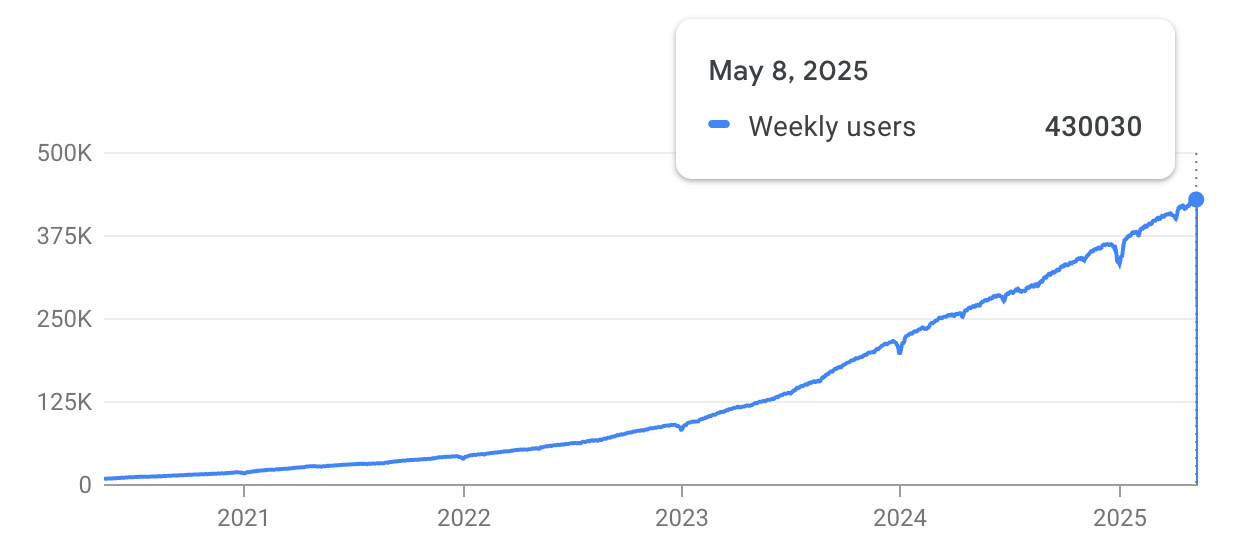
The Detailed SEO Extension (free) now has 400,000+ weekly users. THANK YOU to all that have used and shared it
You may know we're behind the Detailed SEO Extension - something we really appreciate people sharing - which currently sees more than 20,000 new installs each month.
We're admittedly just one small data point, but our growth has not slowed down in the past two years, despite seeing more volatility in the SEO space.
There are lots of extensions much bigger than ours, and some seem to be seeing far more installs than us, which I can only view as a good thing.
AI can provide vastly superior answers to traditional search results
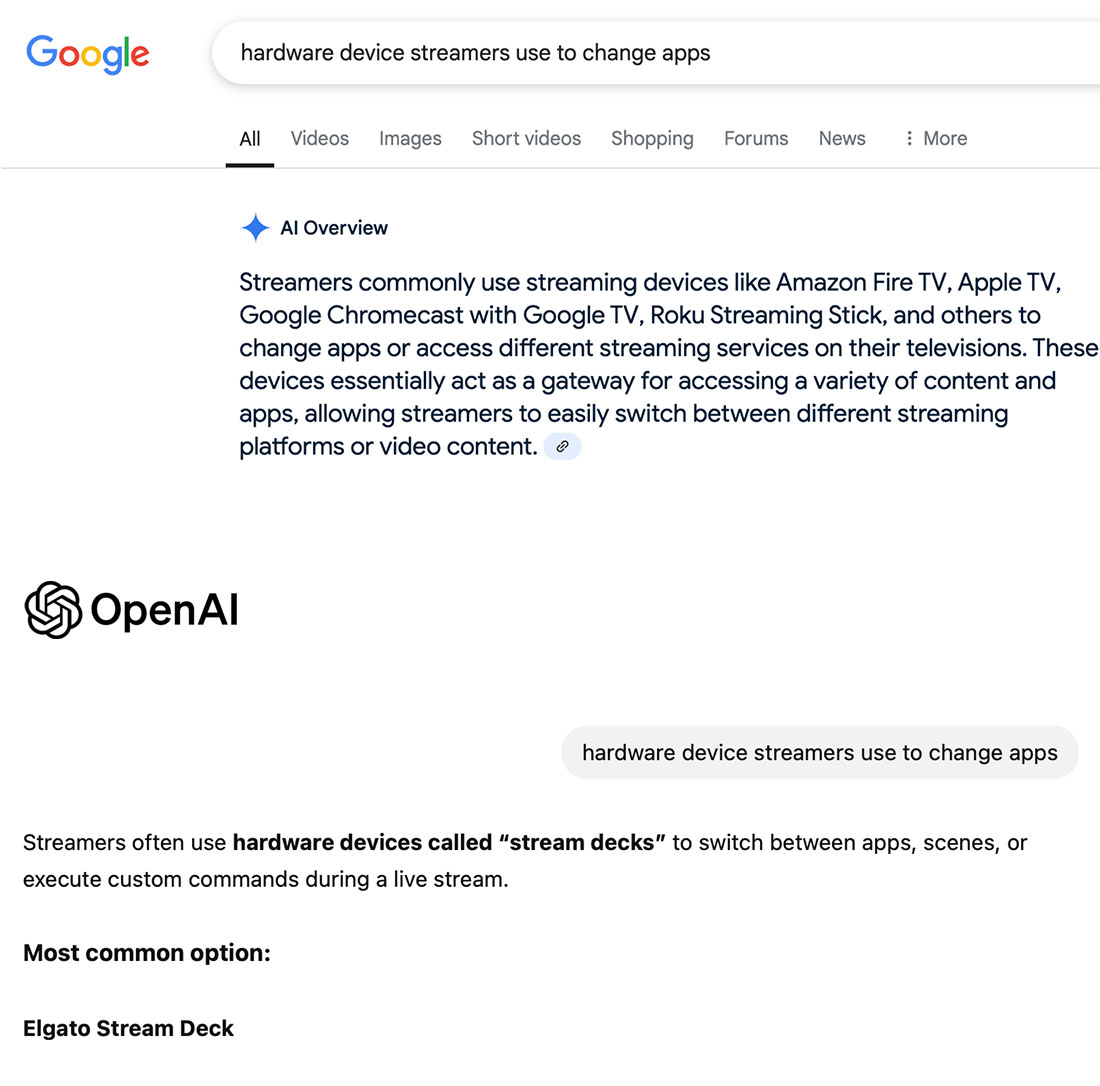
Click 'read more commentary' for the full story, but ChatGPT can nail answers that Google's own AI struggles with
There have been countless times where I've tried to find something on Google and struggled, only for ChatGPT to quickly provide exactly what I'm looking for without needing to click around the internet.
As someone with websites, past clients and students who benefit from these clicks, I don't enjoy writing that, but it is the reality of the situation we're in right now.
The personalisation and depth of answers at times can also feel far superior to what a more general article on a topic might help with.
There's a good likelihood that in time, more people are going to perform searches without the expectation of clicking on websites to find what they're looking for.
As a good personal example, I tried at least five different search queries to find the name of hardware streamers use to quickly open and close apps, handle lighting and so on. Despite being a bit of a nerd and knowing how to manipulate queries to my liking, I still couldn't find the name for the hardware device I was looking for.
Lazily asking ChatGPT in a way that I wouldn't typically write into Google instantly gave me what I was looking for: A Stream Deck.
Of course, this is just one example, and AI Overviews in Google can better answer this now, but when one platform answers a question another can't, it's easy to change your search habits.
More than 5 trillion searches are being made on Google each year (and they just said that number is growing)
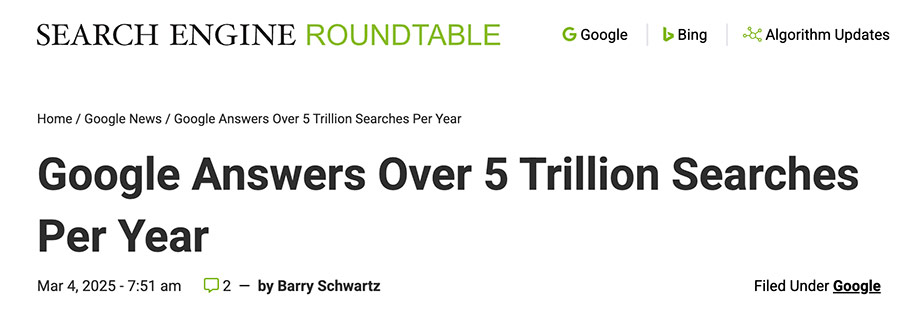
Google announced how many searches they're seeing each year, then later announced the number is increasing
March 2025 brought the news[1] that Google now processes more than 5 trillion searches each year.
This is based on internal data from January 2025, and a significant increase from the two trillion searches they generated in 2016, which is when I understand the previous figures were shared.
While Google has been accused of inflating these numbers (like search results with links that generate new search results), their reach is still unmatched.
In May 2025, when responding to a comment from an Apple executive, Google put out a short statement[2] saying "We continue to see overall query growth in Search". They added, "That includes an increase in total queries coming from Apple’s devices and platforms".
Across 100 forums owned by a single company, 88 have seen search traffic decrease in the past 12 months

Vertical Scope forum GTR.co.uk has 71,000 members who have made over 2.4 million posts
One of the most interesting brands I track and report on is VerticalScope, a public company behind "over 1,000 online communities" like Dog Forums, Skiing Forum, GTR.co.uk and Mazda 6 Forum.
Over the last 18 months they massively benefitted from Google's change to more prominently feature forums in search results, but the tide may be turning there.
Looking at the year-over-year search traffic changes for 100 of their forums, third-party data suggests 88 have seen search traffic decrease.
To be respectful, I don't want to go into too much detail on the specific sites, but some estimated to have lost traffic include MTBR.com, ArcheryTalk.com and AskAndyAboutClothes.com.
Many sites appear to have dropped in traffic levels to where they were around two years ago, before forums started featuring far more prominently in search results.
Just as I was about to share this report with the world, VerticalScope confirmed they've seen overall traffic drop 8% year over year. They believe Google is now prioritising AI Overviews and YouTube in search results.
I mean all the respect in the world when I write this (and marked it as 'Somewhat Negative') but this may be a good sign for content site owners which lost out to forums in recent years.
In a typical week, 10,000+ people create an Ahrefs account

A screenshot from the Ahrefs homepage in May 2025
Ahrefs is one of the most popular SEO SaaS platforms on the web and something I'm happy to pay for.
For years the company has prominently displayed on their homepage how many new user accounts are being created each month, and as I write this that figure stands at 15,000+ for the past 7 days.
Granted, Ahrefs has added many features to make their platform more enticing over the years, like free analytics and their own take on Webmaster Tools.
That said, from my research the number is generally as high as it has ever been over the years (which you can check for yourself in Archive.org snapshots of their homepage).
Reddit didn't like my last report, but a year later Google is still ranking their spammed "best [product]" threads
![Reddit didn't like my last report, but a year later Google is still ranking their spammed "best [product]" threads](https://detailed.com/wp-content/uploads/serp-clean.jpg)
My original data from last year, but it's still so easy to find examples as of now in May 2025
It's no secret to anyone in marketing that over the past few years, Reddit has seen an absolutely huge surge in its presence in Google.
Last year I released a report showing how countless top-ranking Reddit threads had been spammed, which got picked up by Search Engine Land and even prompted a response from Reddit themselves.
Reddit disagreed with my analysis (of course), but I absolutely love that Search Engine Land had my back and shared that they can easily find the same problem[2].
What's worse is that Reddit knows about this issue and Google has to know about it, but it's still incredibly easy to find top rankings which have been abused.
In Reddit's defence (yes, I'm still writing that despite their response to me), they have an incredibly difficult challenge on their hands. When your search engine traffic grows by hundreds of millions of monthly visitors, spam will increase.
Still, I'm not expecting them to catch everything: Just threads bringing in a ton of search traffic and have clearly been spammed to influence how people spend their money.
SEO conferences are still popular, and new ones are expanding their reach
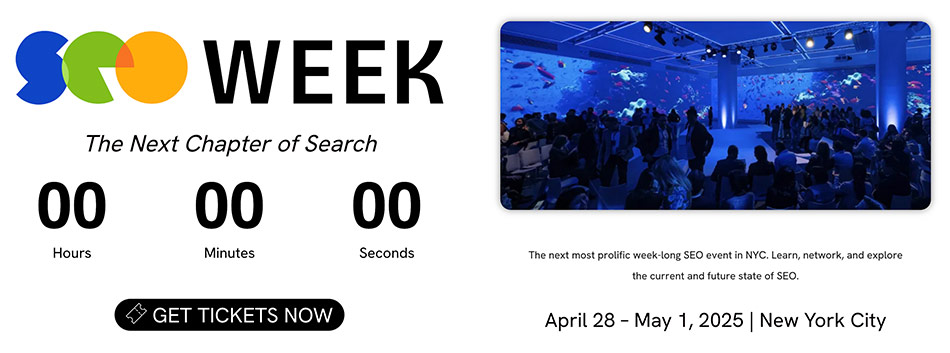
SEO Week just wrapped up its first ever event on May 1st, 2025
Each year thousands of people attend what is arguably the most well-known SEO conference, brightonSEO. In 2023 they also expanded stateside, and in 2025 they're still hosting three-day events there.
Other events have launched in the past year such as Spotlight by Semrush, Evolve by Ahrefs, and SEO Week from Mike King.
Most countries have their own events, like SEO IRL from Steve Toth in Canada, Sydney SEO from Prosperity Media and the UK's SearchNorwich event by Mark Williams-Cook.
AI makes a lot of mistakes, and in some industries like Travel, research to verify information makes sense
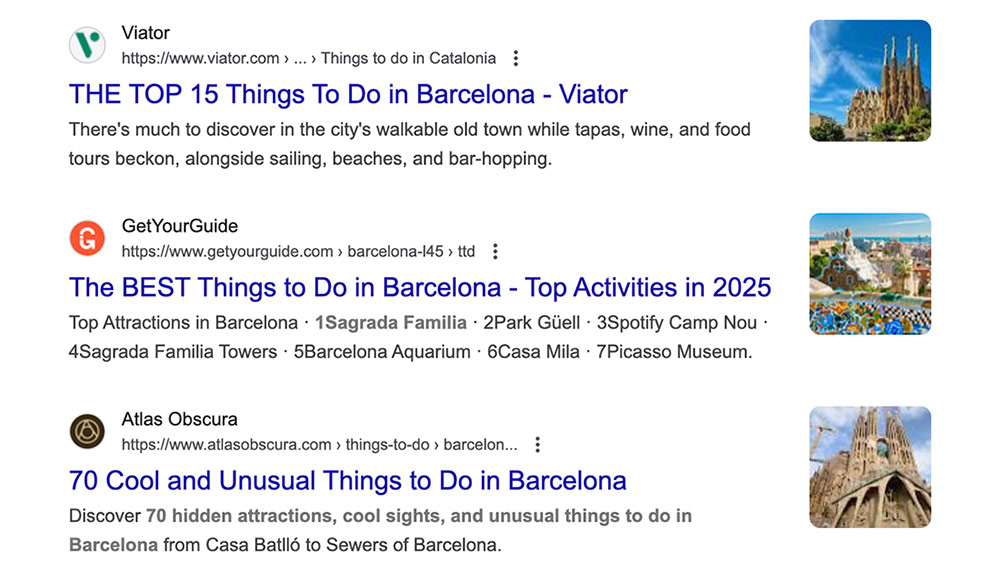
Do you trust AI to decide your travel plans? Logic & opinion suggests it's at least one niche people can't afford hallucinations
While AI has transformed industries and made specific work considerably easier to handle, it's still very prone to "hallucinations", which is a nice way of saying it can completely make things up.
There have been countless public examples of this.
Because of these public inaccuracies, they've undoubtedly made many people less trusting of the answers they give, encouraging them to continue to do traditional research by clicking around various websites.
I like this quote from travel platform Trivago's Q1 2025 earnings call, where they said, "As we know, travelers use dozens of sites in that travel research. We think this will not fundamentally change."
CEO Johannes Thomas added, "It's [travel] a high stake product. People don't want to make mistakes. So they really invest time into comparing using different tools. I also think this wouldn't change."
Google has a clear incentive to make search good enough to come back to
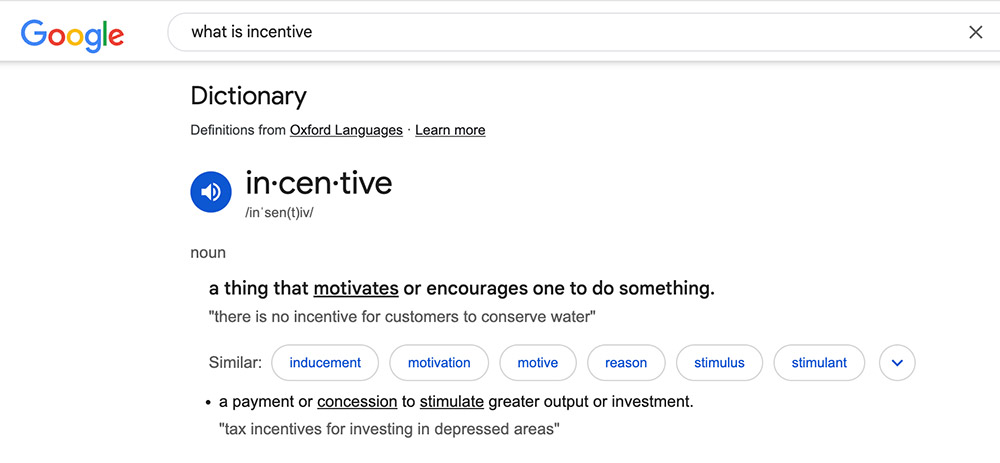
When AI first became a reality, many people argued Google wouldn't want to cannibalize their own ads business
While it can feel like Google is on a mission to destroy its credibility and take out the businesses of site owners with them, Google generates more than half of its revenue from their search engine.
Other sources of revenue include YouTube, Google Cloud and the Google Play Store.
They're beyond pushing the boundaries of what's fair - as I'll cover in another section - but there's an obvious reason they don't want to take things too far: They need people to keep coming back and searching to generate ad revenue.
Before AI rolled out so prominently this was a common argument people would make to help tone down any fears. Now I think it has gone far beyond expectations.
I can only hope we're getting close to the limit of what users will accept.
While we no longer offer SEO services, great companies are still reaching out for help
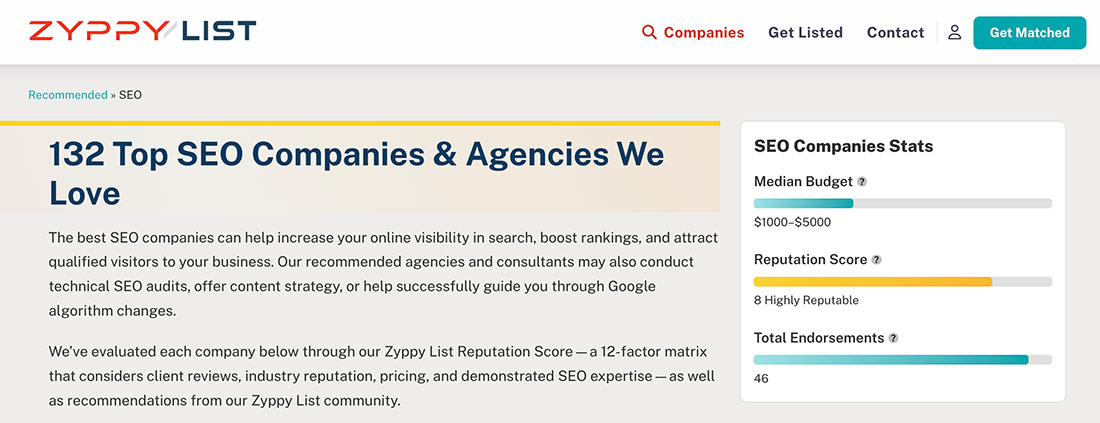
Cyrus Shepard's recently launched Zyppy List features lots of SEO companies offering help
At the start of 2024 we (Detailed) stopped offering client services. This was a big deal for me since it's something I've done for over a decade now.
We may resume then in the future, but we wanted to have more time to grow our other projects. One which is public-facing is Gaps.com, where v2 is launching very soon.
I promise I say this with no ego, but we're still getting regular opportunities to work with great companies, and we're a tiny fish in a huge pond that doesn't have any obvious call to action to contact us for help.
Of course this is all anecdotal, but I can only speak from our personal experience, and companies are still actively seeking help to improve their rankings.
I (Glen) at times offer once-off video audits, but they have been closed for a few months while I focused on launching the next version of Gaps. They may open again at some point this year.
If you're interested in finding companies that may be able to help you, check out a directory like Zyppy List (no affiliate link or commissions) from Cyrus Shepard.
Popular SEO SaaS platforms are moving beyond just SEO
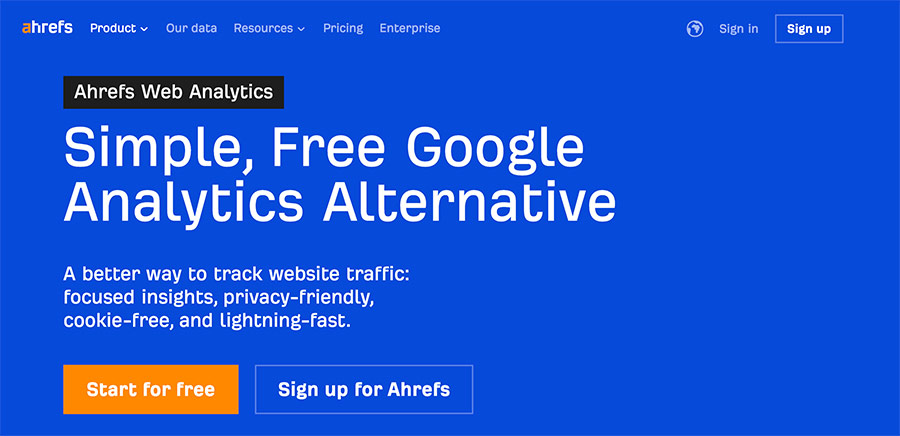
Ahrefs' new analytics product, already used on 10,000+ sites, was an incredibly smart idea
If you track what many of the most prominent players in the SEO SaaS world are up to, it's clear that many of them are expanding their offerings far beyond traditional SEO research tools for link building, keyword research and technical SEO.
Many now offer AI content writers, non-SEO analytics, brand scores and more.
Of course there are obvious reasons for this that aren't a concern, like trying to offer an all-in-one solution so people are less likely to go to competitors.
That said, logic suggests they're also concerned about the future of SEO and want to limit their risk.
Semrush even just said on their Q1 '25 earnings call that they considered themselves an SEO platform in the past, but now they're a digital marketing platform heavily focused on AI.
Once again this is something open to interpretation, but I'm trying to be less of a fence-sitter and speak what's on my mind, and this feels like a trend.
Ads are likely coming to AI search competitors, making them (slightly?) less enticing
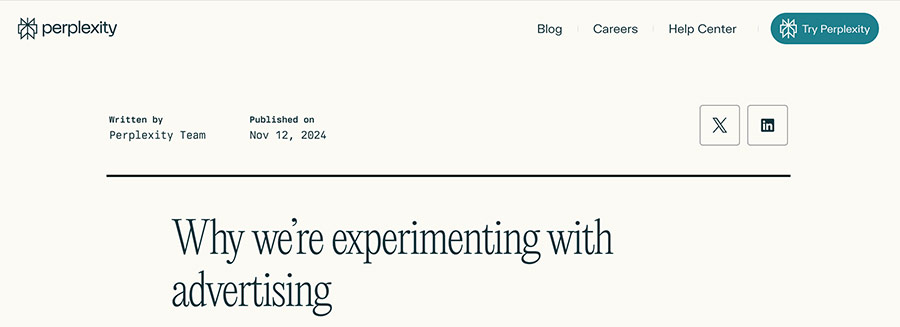
In March of 2025 Perplexity has fewer than a dozen advertisers on board, but now expects that to increase.
In November 2024, popular AI-powered "answer engine" Perplexity announced it would begin experimenting with ads on its platform.
A March 2025 article from AdExchanger confirmed "less than a dozen" advertisers were on board, but more were on the way.
One of the most appealing things about engaging with various AI platforms is how clean and minimalist they are, with a focus on answering questions in one place.
We can't expect that to be the case forever, and if many are losing money as is being reported, they will need to turn on the ad revenue faucet at some point. It won't make people stop using them, but it will take away an advantage they currently have over more traditional search engines like Google.
Google appears far more open to abusing their position and pushing the boundaries of what's "fair" for content creators

Feel free to tell me you disagree, but Google appears to care far less about providing quality search results than they ever have in the past.
The company has no problem taking as much content as necessary to power their AI Overviews and other AI products, without giving a fair share of traffic to the source of that content in return.
They're writing what has essentially been an unwritten agreement for decades in their own favour.
There are countless recent examples where Google is pushing the limits of what is ethical, seemingly in an attempt to make Google the sole destination people should visit.
While they regularly comment about wanting to ensure they're giving more and more traffic to the broader web, their actions don't currently match up.
For the 600+ startups we track at Gaps.com, more than half have gained search traffic in the past year
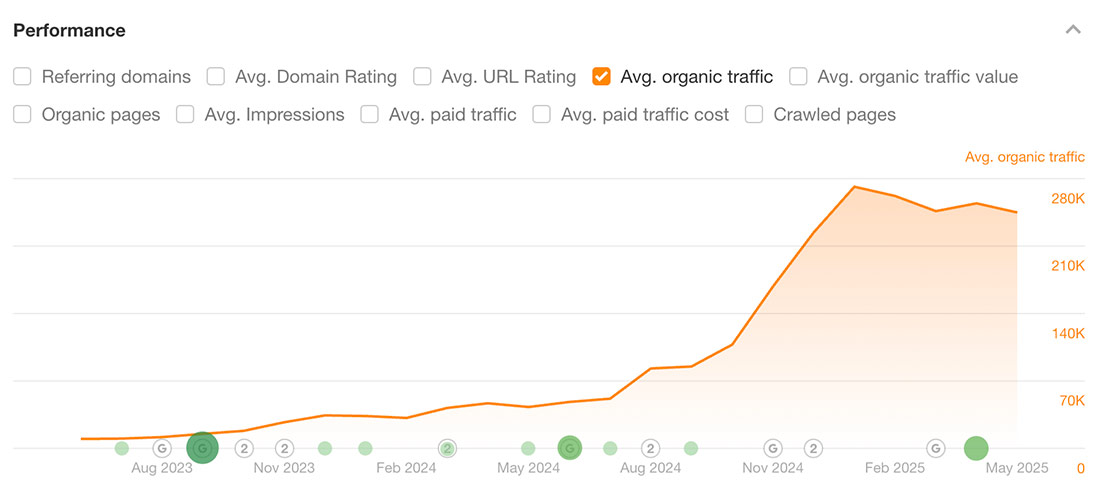
A clear increase in search traffic for one of the sites we track. You can see some specific startups covered in the full description
At Gaps.com we track the revenue and funding updates of 670 startups. Comparing search traffic from April 2024 to April 2025, 367 of those startups (54.7%) have seen it increase.
If we remove the 20 domains of startups that have redirected their sites in the past 12 months (and thus will see growth after starting from scratch), more than half of the sites we're tracking still show increases.
We've seen these increases year-over-year for every month in 2025, with January 2025 resulting in 392 startups having more search traffic than in January 2024.
To be respectful I don't want to share too many of the sites, but some specific examples include:
- Revolve.com - An online fashion marketplace
- ContentStudio.io - a social media management platform
- Karrotmarket.com - a local buy and sell marketplace
- Photoaid.com - a passport photo creation service
I should preface this by saying that no third-party data will ever be perfect. That said, it's the same third-party data we're using to determine that the content sites of Digital Goliaths are losing search traffic (first insight in this report).
One thing I should comment on is that companies which receive funding or report on their monthly revenues tend to be newer. Logic suggests (or at least it did for a long time) that search engine traffic will increase as long as you're putting out more content and growing the status of your brand (via social media, digital PR, and so on).
I still view this as a positive, and many of the companies have been around for many years, but it should be noted.
While public companies don't all make negative comments about the future of SEO, none appear overly positive
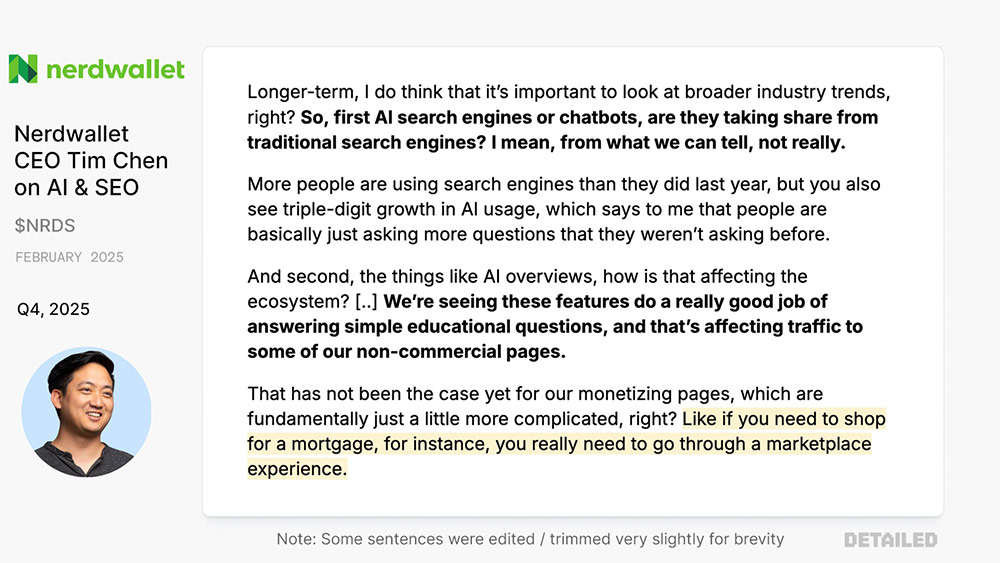
When considering whether AI search engines are taking traffic from traditional search, Nerdwallet founder Tim Chen said
If you're familiar with my writing, you'll know I regularly share what public companies say about the state of search engine traffic to their websites.
Companies I've reported on include Nerdwallet, LendingTree, Dotdash Meredith (behind People, AllRecipes and dozens more), Ziff Davis (Cnet, ZDNet, Moz, etc.) and Future Plc (Marie Claire, Techradar).
While there's an argument to be had about companies not wanting to be pessimistic about the future of search to investors, there's far less of the doom and gloom you see on social media.
Some exceptions exist, like the public company behind LiveChat.com and HelpDesk.com saying "SEO is more difficult now" in their recent earnings update.
Companies also appear to be reassuring investors by noting how their reliance on traffic from search engines has decreased.
I would say commentary is fairly neutral across the board, but what I'm really missing is companies being overly positive about the future of search and how they plan to grow their traffic with the channel. That just isn't happening at any scale.
AI Overviews in search results are clearly reducing clicks to organic listings
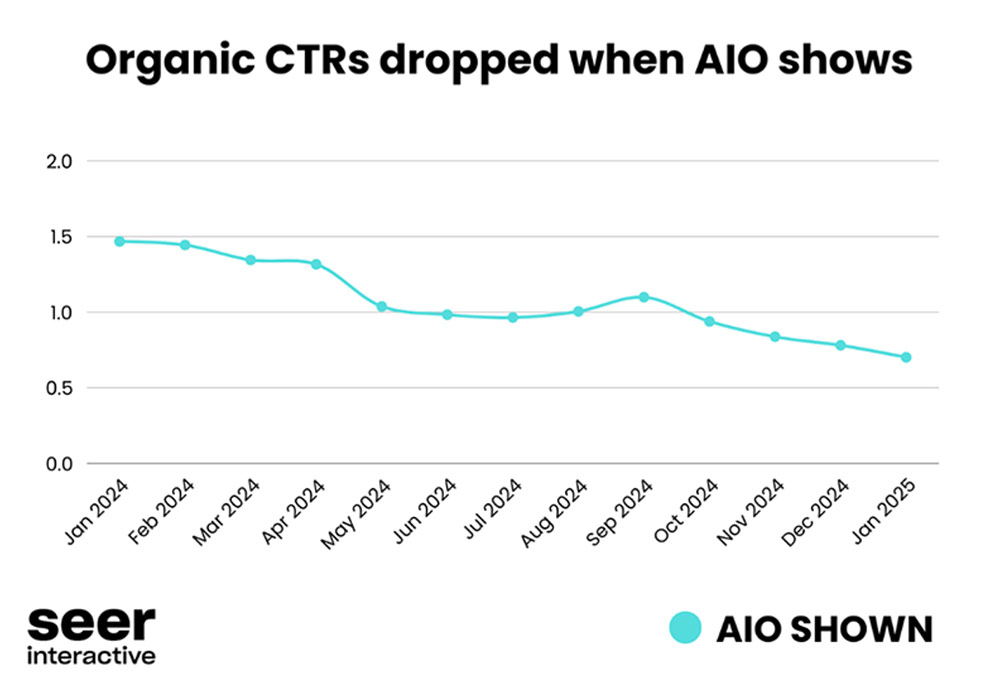
A study from Seer Interactive lines up with the numbers we're seeing from a lot of other reports
While Google will claim that users love AI Overviews, the users seeing them are also far less likely to click through to websites when they're present.
Similarweb showed sites receive 20% fewer clicks when AI Overviews are present.[1]
Ahrefs data showed they reduce clicks by 34.5%.[2]
Data from Amsive saw a click-through rate decline of 19.98%.[3]
Seer Interactive found that click-through rates are at an all-time low when AIO appears.[4]
Out of the top 50 UK Local news sites, 35 (70%) saw traffic increase in the past year

Manchester Evening News saw
While revenue and profit are the fundamental guiding factors for a successful business, seeing the latest traffic numbers from IPSOS in the UK is at least a slight positive.
Of the top 50 local news sites in the UK, specifically offering news covering individual cities, 35 sites saw traffic increase compared to 2024.
Sites that saw increases include Manchester Evening News, Wales Online, Examiner Live and Devon Live.
The data doesn't only cover search traffic, but it's good to get an idea of how certain industries are fairing online, especially when they're producing content and search is a huge source of visitors for them.
Keep in mind there will be some bias here because the article is looking at the top fifty sites overall, which makes it more likely we'll see increases. That's another reason I labelled this as 'Somewhat Positive' rather than just 'Positive'.
My understanding is that the data is comparing February 2025 to March 2024.
Despite promises they have nothing to improve, many content sites have all but disappeared from SERPs
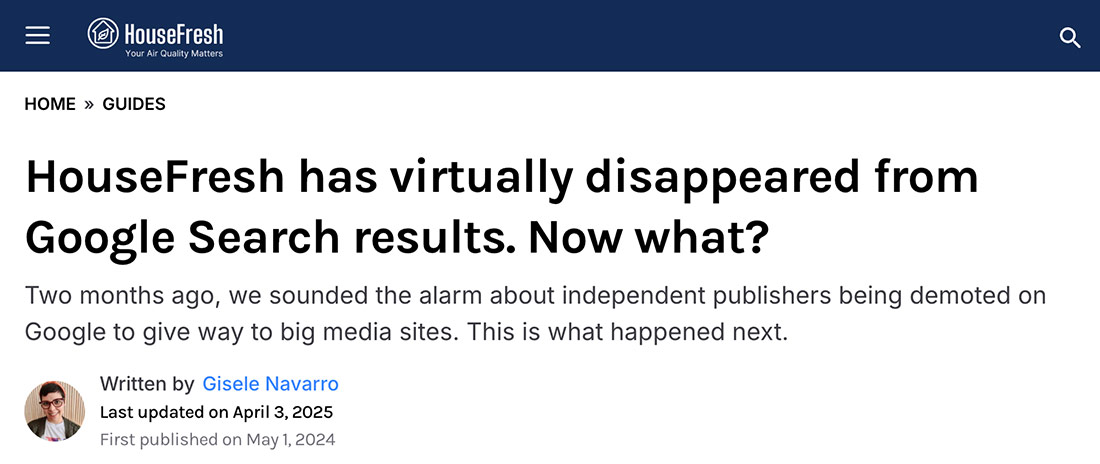
Housefresh was one of many public examples of sites impacted by Google changes
There's not much for me to say on this that hasn't been said already, but a hot topic for 2024 was how many content sites had been impacted by Google's Helpful Content update from the previous year.
Sites that were public about being impacted include Retro Dodo, Housefresh and Travel Lemming.
The topic was especially newsworthy as Google had put on an in-person event for many of the webmasters impacted.
There appear to have been some partial recoveries since then, but little that's positive for the state of content sites overall.
The sentiment for the future of blogs and resource sites in search results has to be at an all time low.
The number of paying Semrush customers continues to grow (albeit at a slower rate)
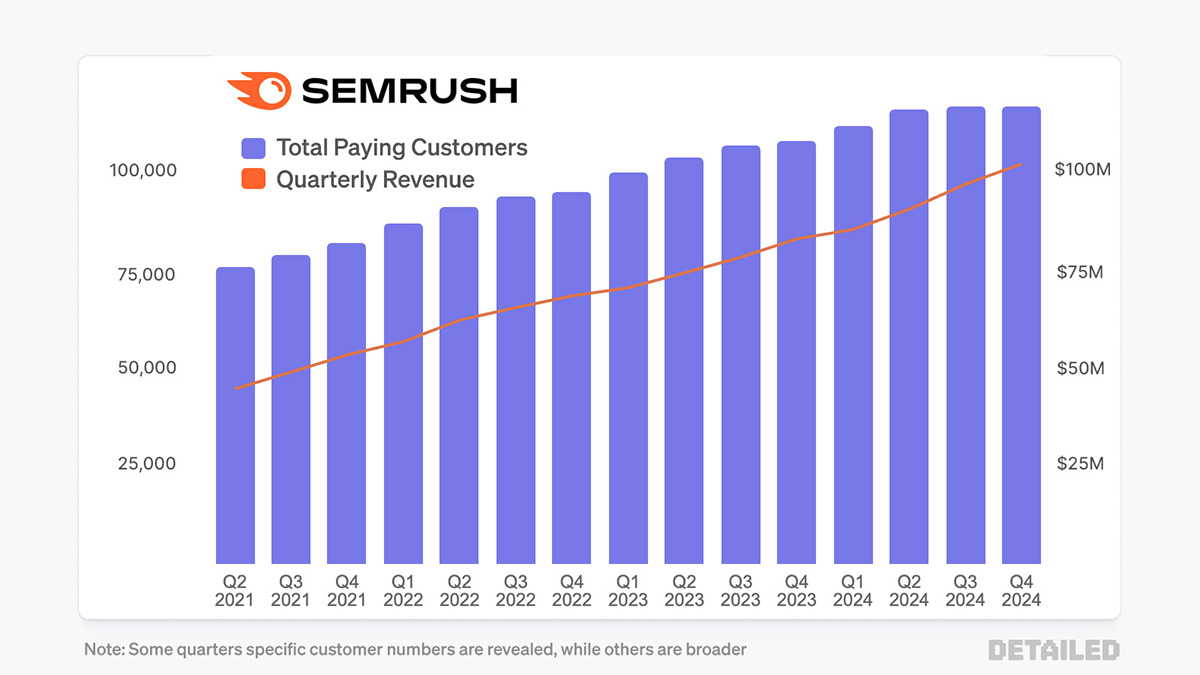
As of Q1 2025, Semrush has 118,000 paying customers, up 5.1% year over year
Semrush's most recent earnings call revealed they have "approximately 118,000 paying customers" and 1M registered free active users.
The number of paying customers was "just" 1,000 higher than what was announced in the prior quarter, but still up 5.1% year over year.
While Semrush has evolved far beyond just SEO these days (they track non-search traffic soucres, have a content writer, and so on), at least for now it's still what the platform is primarily known for.
With the content site model becoming more difficult, the Linkerati is likely decreasing, fast
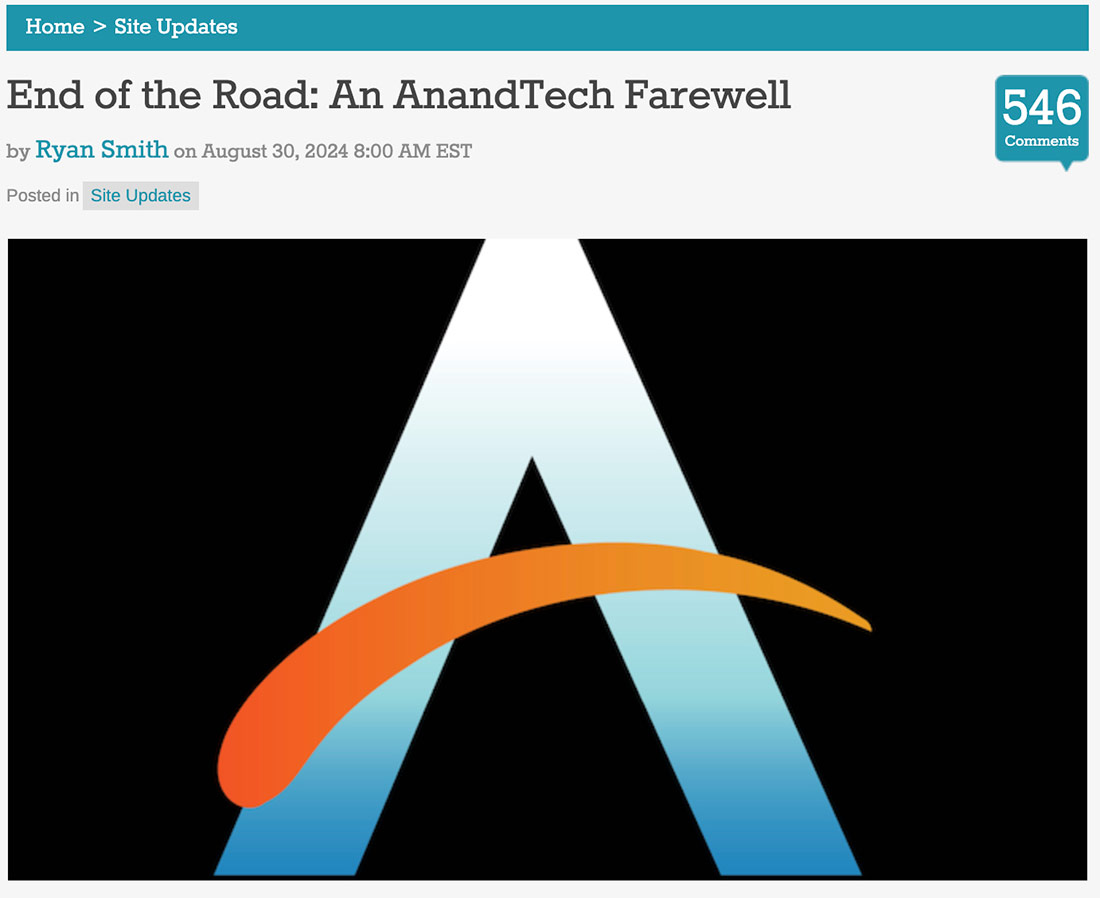
Tech site AnandTech shut down after 27 years, stating,
"Linkerati" is a term coined by Rand Fishkin over a decade ago, used to describe the people with the ability to link out from one website to another. Think: Site owners, freelance writers, prolific guest posters, forum users and so on.
If there's going to be a huge shift in the business model of producing content, whereby search engines are taking that content to output answers but no longer providing them with adequate traffic in return, it stands to reason that the number of people who can link out (the size of the Linkerati) will massively decrease.
There's a good argument to be made that this will make link building for newer or less-established sites far more difficult, allowing digital goliaths to continue to thrive in an algorithm that still clearly rewards backlinks.
Siege Media founder Ross Hudgens also made some great comments on this (Tweet link), suggesting the difficulty of SEO and the rise of posting on social media are also contributing factors.
As a small side note, it also doesn't help that big brands like Shopify have started nofollowing all of their external links.
It's possible that Google moves their algorithm further away from links, making this less of a concern, but the point remains.
Yes, you can still grow content sites with search traffic. I just wouldn't rely heavily on it
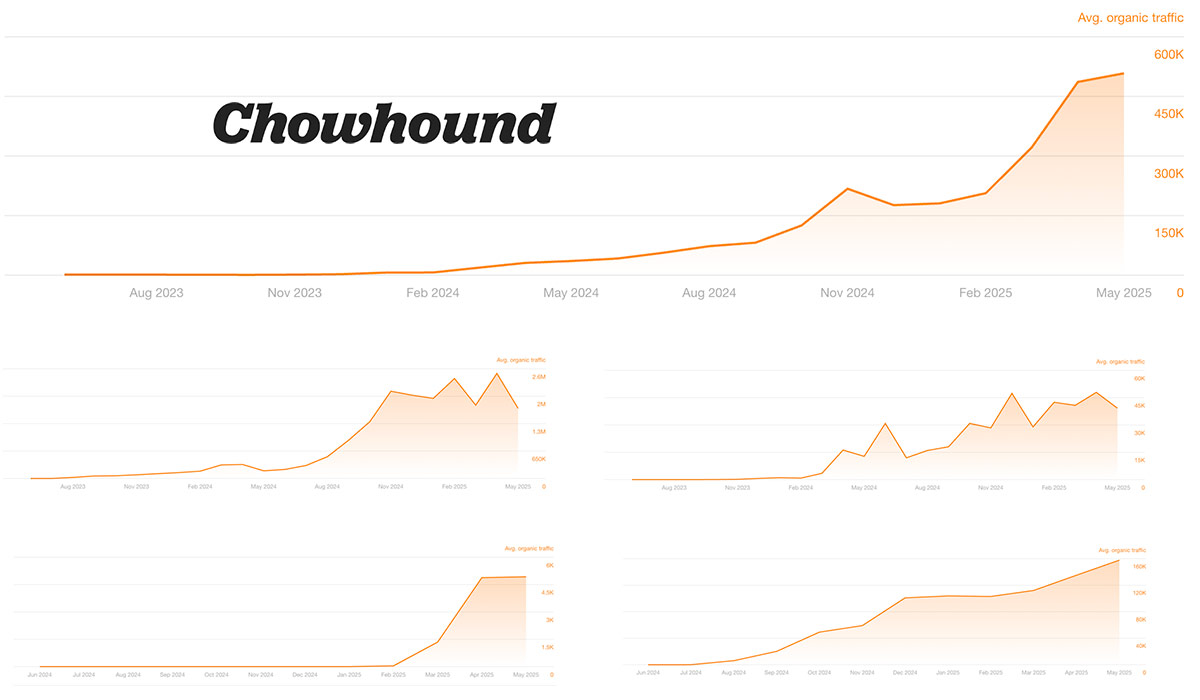
Full disclosure: Many examples I come across have Digital Goliath owners (which is why I'm tracking them)
If you were under the impression that content sites reliant on search traffic don't have a future, you may be correct long-term, but many still appear to be doing well in the present.
I'm always careful about who I mention as not everyone wants the spotlight of the SEO industry on them, but one good example is that of Chowhound.com.
In an October 2023 tweet I proclaimed "Chowhound is back" after previously having its closure featured in an article on The New York Times.
It took quite a bit longer than I expected, but at least in third-party tools they're seeing great success under their new owners.
As I made clear at the start of this report, the majority of content sites I track (blogs and news sites) have seen declines year over year. There are definitely lots of exceptions though, and I don't think they should be completely written off.
I personally still build websites with the aim that they'll be able to pick up a lot of targeted traffic from Google. I just also make sure there are other traffic sources I could profitably get visitors from.
It's likely there will be considerable volatility in search results for the foreseeable future
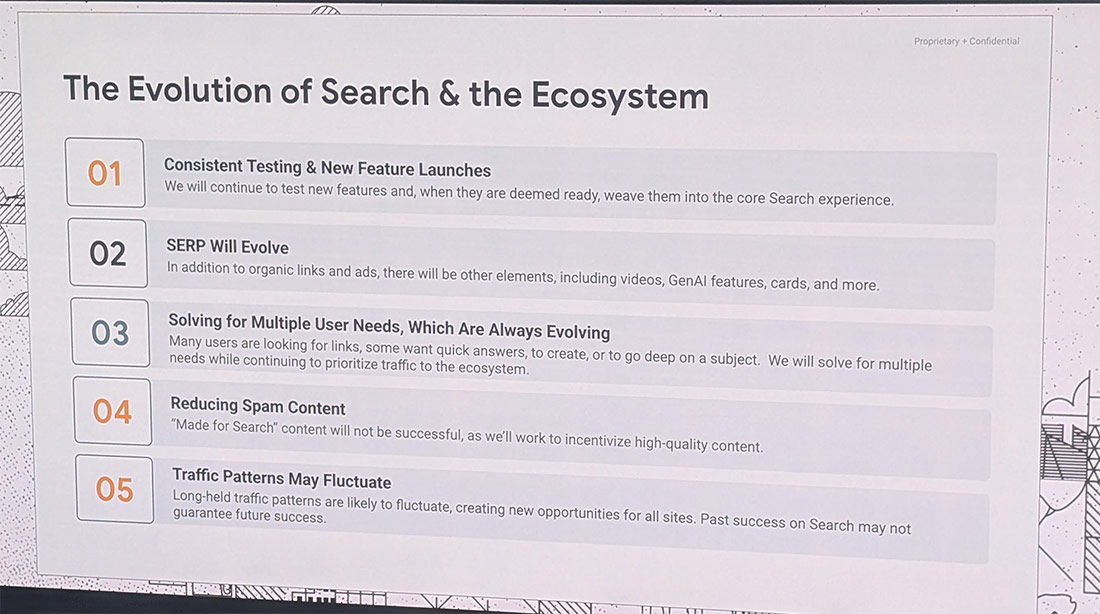
Mike King shared a photo from a Google event where we can expect fluctuating traffic, new SERP features and their continued evolution
We're not yet at the stage where this is the "new normal" and we've plateaued to a level of clicks we can expect to stay consistent.
While it's not hard to see how active Google has been in changing how search results are displayed - including AI Overviews - but they recently confirmed more changes are coming.
At the same event as Mike's tweet (pictured), Google also claimed that they know users like AI Overviews and search more because of them.
Multiple studies show AI Overviews are becoming increasingly present atop search results
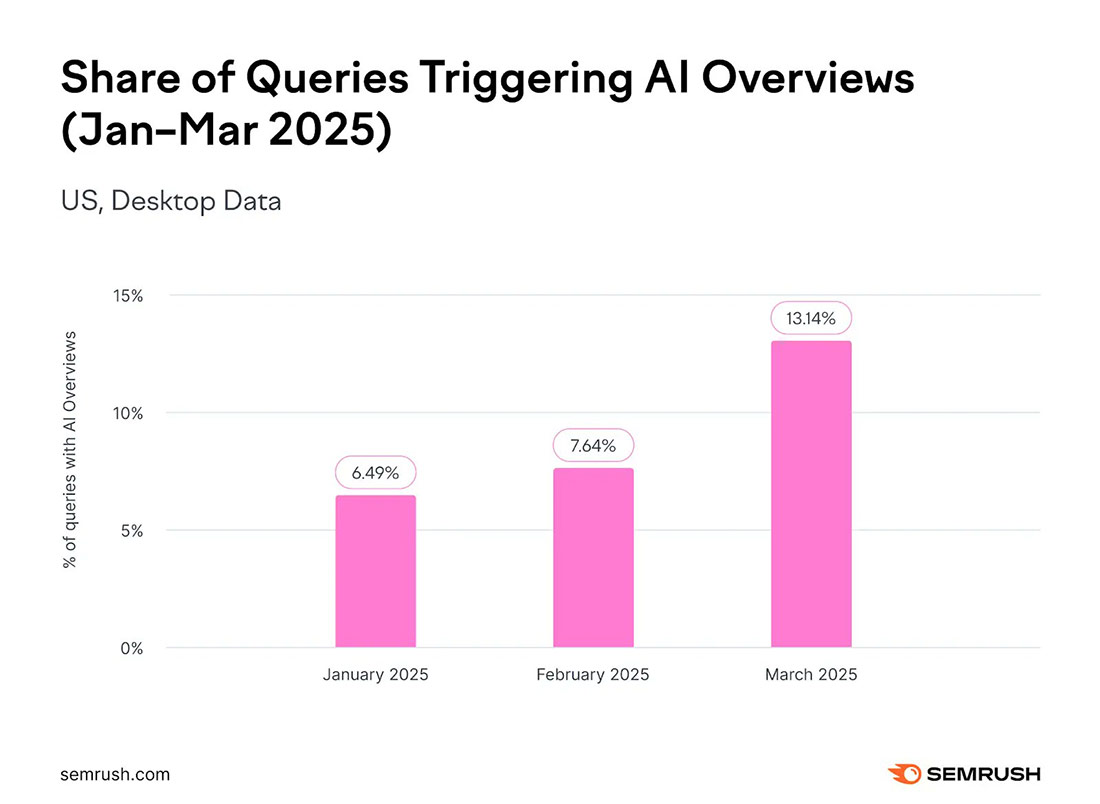
A Semrush report shows 13.14% of all queries (US, Desktop) triggered AI Overviews in March 2025.
Not only are AI Overviews clearly taking clicks away from regular search results, but they also appear to be increasing in prevalence.
Multiple studies have shown this, including a May 2025 report from Semrush which found AI Overviews were present in 13.14% of all Google queries.
Semrush specifically looked at desktop users from the US for their study, finding the presence of AIO almost doubled in March compared to February.
According to the latest Statcounter data, Bing is slowly taking Desktop search market share* from Google
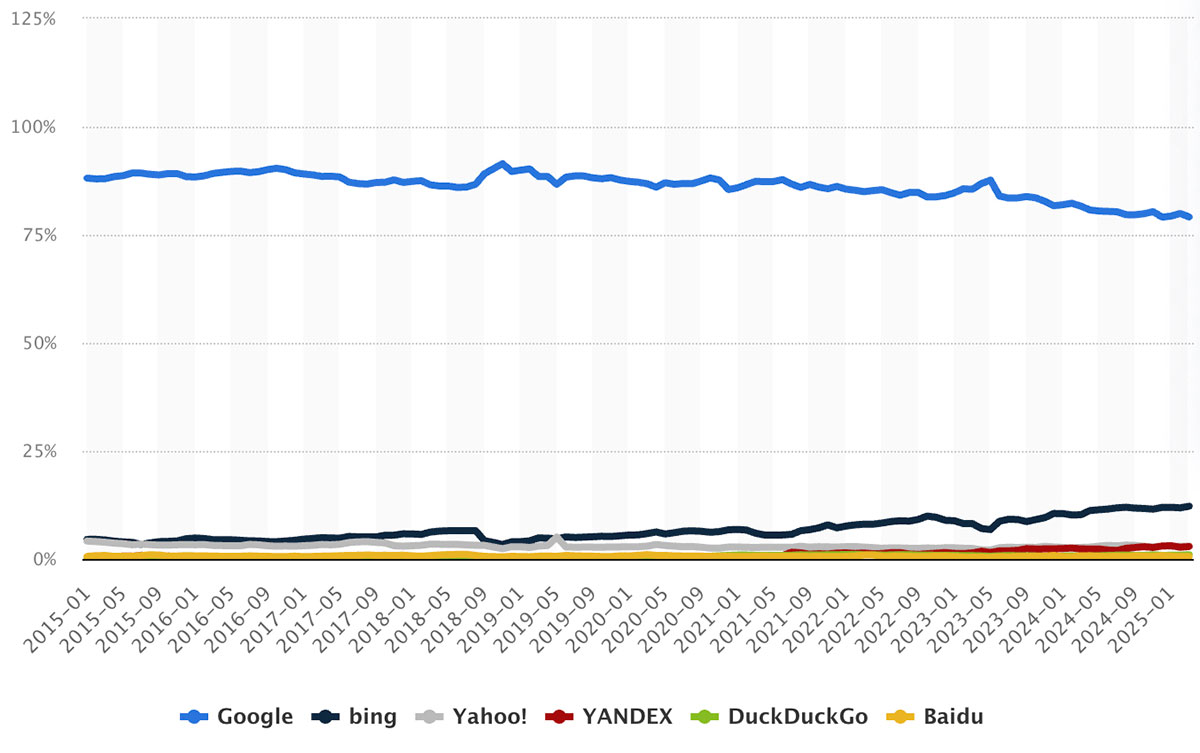
The last point on the graph is from March 2025
Admittedly the numbers aren't huge, but according to data from Statcounter, Bing has increased their desktop search marketshare from 10.51% to 12.21% from January 2024 to March 2025.
Meanwhile, Google's share has dipped from 81.95% to 79.10%.
From an outsider's perspective Microsoft has appeared to be more webmaster-focused in recent years, and more competition for Google can only be a good thing.
*Note: Statcounter and anyone who reports on their data refers to it as 'search engine market share', but their data is based on referrals to websites, rather than actual usage.
It may be the case that Google is simply sending fewer visitors to websites as a whole, so I'll try to get more data here.
Questionable Quora content still trends in serious Health-related search results
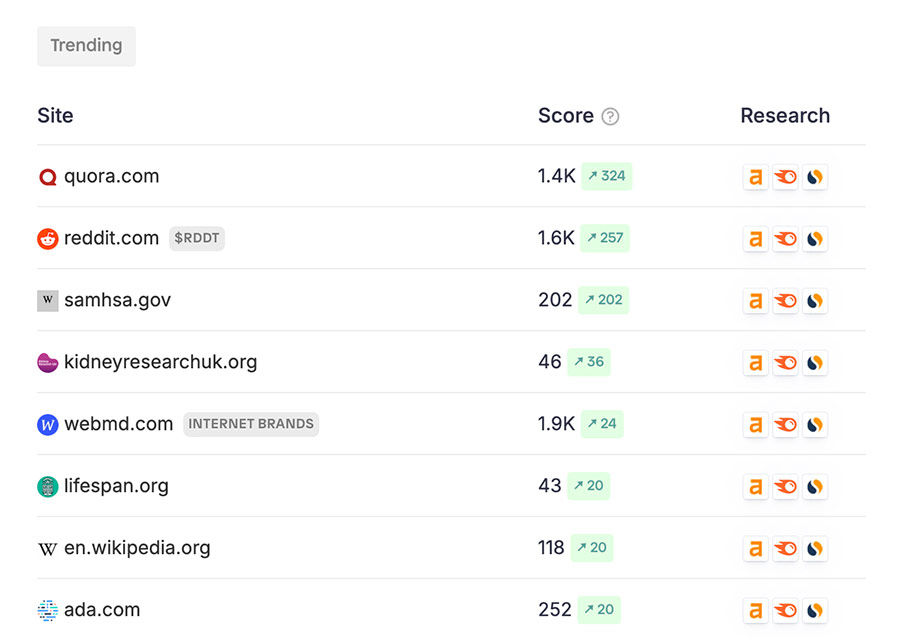
According to our data, in May of 2025 Quora is the number one trending website in search results for health symptoms-related queries
A topic I've been talking about for over 18 months now is how I've found highly questionable Quora answers ranking for some of the most serious health conditions that humans can face.
It's amazing to me that in May 2025, they're currently the top trending site in the world for symptoms-focused keywords.
While I'm admittedly not a fan of the Quora platform, I try not to be biased in my discussions here and admit that there are primarily helpful answers to be found on the platform.
Unfortunately it's not hard to find some of their top rankings completely stolen from other websites like Wikihow (including the images) or top replies promoting WhatsApp groups for voodoo magic.
They do seem to have made improvements here, which I give them credit for, but both companies should be doing better.
I don't understand whether Googlers are somehow not seeing these search results or worse...they just don't care.
Just like I wrote for Reddit, I'm not expecting Quora to stay on top of all spam on the platform. That's unrealistic, especially when much smaller platforms can't keep up.
Instead, I don't think it's a lot to ask that they regularly dive into their top ranking pages for health, product, finance and other important topics to see which have been abused.
Google Discover coming to Desktop could be a huge additional source of traffic for content sites
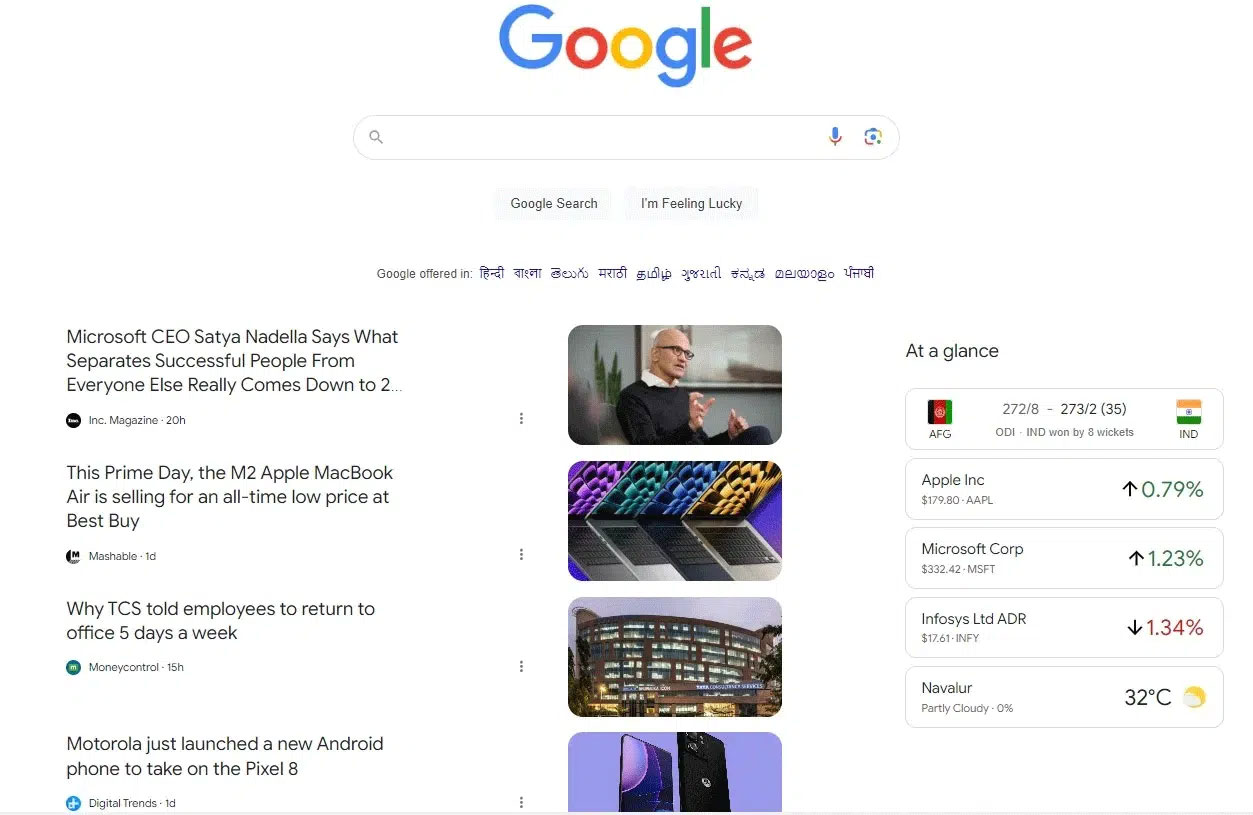
One of many tests of Google showing Discover on their homepage
In April, Google revealed that Discover - their content discovery feed - will be coming to Desktop.
For some large content brands, Google Discover sends more traffic than ranking in traditional Google search. Making this available to more users on what is arguably a better source of traffic (Desktop vs Mobile) can only be a good thing.
This has reportedly started rolling out to some users already.
July 2025 update: Google has now launched AI summaries of Google Discover listings, somewhat tarnishing the excitement for this rollout.
I've made it really easy to keep this report updated (pictured). With that in mind, I would absolutely love your feedback on version one
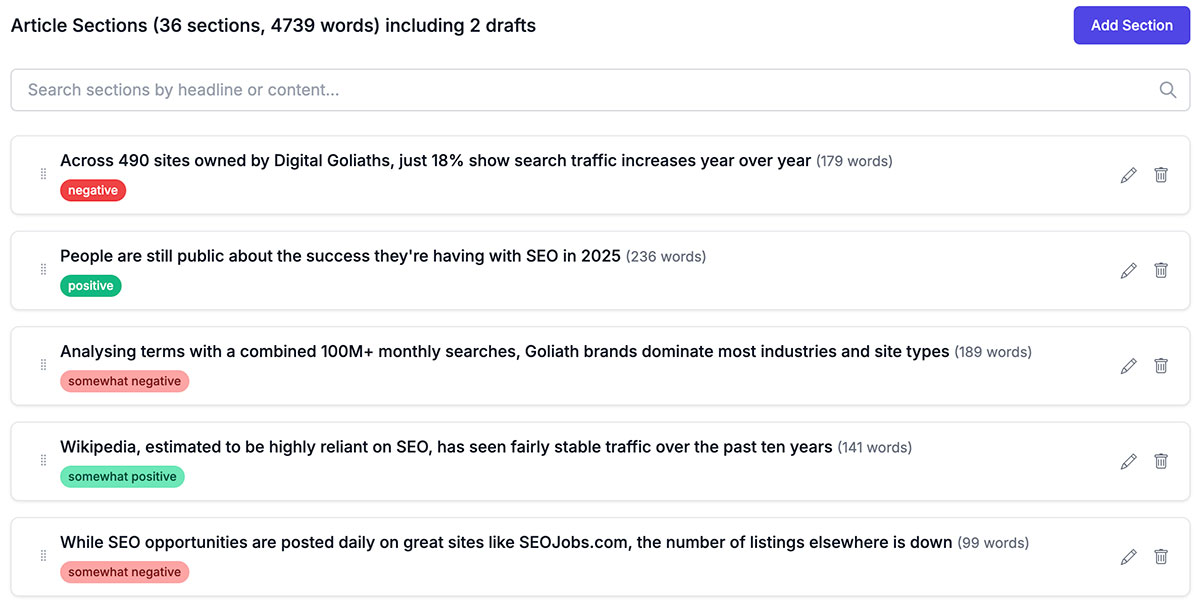
I envision this is something that will need regular updates, so I made sure it's easy to improve and update
I've been writing about search for more than half of my life and this definitely feels like the most volatile period we've been in yet.
For that reason, I wanted to have a place where I can easily track all of my personal data and the research from others in one place.
If you found this valuable in any way, any shares, likes and comments on LinkedIn, X or Facebook. are much appreciated (those links take you to the specific post about this report).
With the help of AI I built a custom backend for this report so that I could easily keep it up to date, and that's what I intend to do.
The primary sources for data in this report include DataforSEO, Ahrefs, Semrush & Similarweb. When we perform any kind of comparison analysis, we initially start out with DataforSEO data, then manually check results in Ahrefs.
No third-party tool will ever be perfect, but I’ve shared both positive and negative results from the same sources.
While I always strive to share accurate data, at the very least I want to present what is directionally accurate. For example, forums were performing very well for a long time, now don’t appear to be ranking as prominently. This is backed up by what the company in question (VerticalScope) just reported on their Q1 2025 earnings call.
P.S. Want to discuss this report? Here’s the links again to LinkedIn, X and Facebook to do just that.
Thank you!






